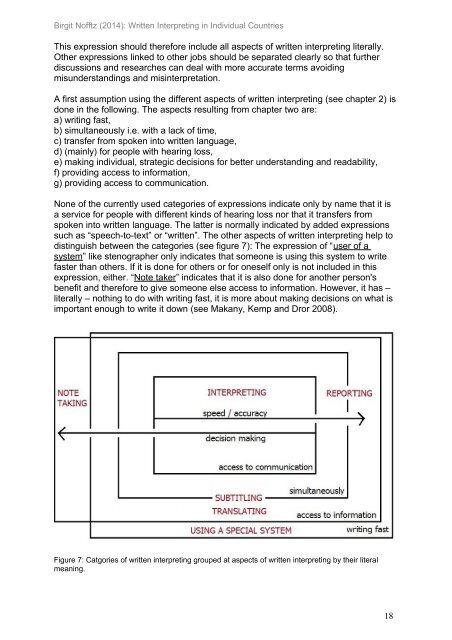Written_interpreting_in_individual_countries_Birgit_Nofftz(2014)
Written_interpreting_in_individual_countries_Birgit_Nofftz(2014)
Written_interpreting_in_individual_countries_Birgit_Nofftz(2014)
Create successful ePaper yourself
Turn your PDF publications into a flip-book with our unique Google optimized e-Paper software.
<strong>Birgit</strong> <strong>Nofftz</strong> (<strong>2014</strong>): <strong>Written</strong> Interpret<strong>in</strong>g <strong>in</strong> Individual Countries<br />
This expression should therefore <strong>in</strong>clude all aspects of written <strong><strong>in</strong>terpret<strong>in</strong>g</strong> literally.<br />
Other expressions l<strong>in</strong>ked to other jobs should be separated clearly so that further<br />
discussions and researches can deal with more accurate terms avoid<strong>in</strong>g<br />
misunderstand<strong>in</strong>gs and mis<strong>in</strong>terpretation.<br />
A first assumption us<strong>in</strong>g the different aspects of written <strong><strong>in</strong>terpret<strong>in</strong>g</strong> (see chapter 2) is<br />
done <strong>in</strong> the follow<strong>in</strong>g. The aspects result<strong>in</strong>g from chapter two are:<br />
a) writ<strong>in</strong>g fast,<br />
b) simultaneously i.e. with a lack of time,<br />
c) transfer from spoken <strong>in</strong>to written language,<br />
d) (ma<strong>in</strong>ly) for people with hear<strong>in</strong>g loss,<br />
e) mak<strong>in</strong>g <strong>in</strong>dividual, strategic decisions for better understand<strong>in</strong>g and readability,<br />
f) provid<strong>in</strong>g access to <strong>in</strong>formation,<br />
g) provid<strong>in</strong>g access to communication.<br />
None of the currently used categories of expressions <strong>in</strong>dicate only by name that it is<br />
a service for people with different k<strong>in</strong>ds of hear<strong>in</strong>g loss nor that it transfers from<br />
spoken <strong>in</strong>to written language. The latter is normally <strong>in</strong>dicated by added expressions<br />
such as “speech-to-text” or “written”. The other aspects of written <strong><strong>in</strong>terpret<strong>in</strong>g</strong> help to<br />
dist<strong>in</strong>guish between the categories (see figure 7): The expression of “user of a<br />
system” like stenographer only <strong>in</strong>dicates that someone is us<strong>in</strong>g this system to write<br />
faster than others. If it is done for others or for oneself only is not <strong>in</strong>cluded <strong>in</strong> this<br />
expression, either. “Note taker” <strong>in</strong>dicates that it is also done for another person's<br />
benefit and therefore to give someone else access to <strong>in</strong>formation. However, it has –<br />
literally – noth<strong>in</strong>g to do with writ<strong>in</strong>g fast, it is more about mak<strong>in</strong>g decisions on what is<br />
important enough to write it down (see Makany, Kemp and Dror 2008).<br />
Figure 7: Catgories of written <strong><strong>in</strong>terpret<strong>in</strong>g</strong> grouped at aspects of written <strong><strong>in</strong>terpret<strong>in</strong>g</strong> by their literal<br />
mean<strong>in</strong>g.<br />
18


